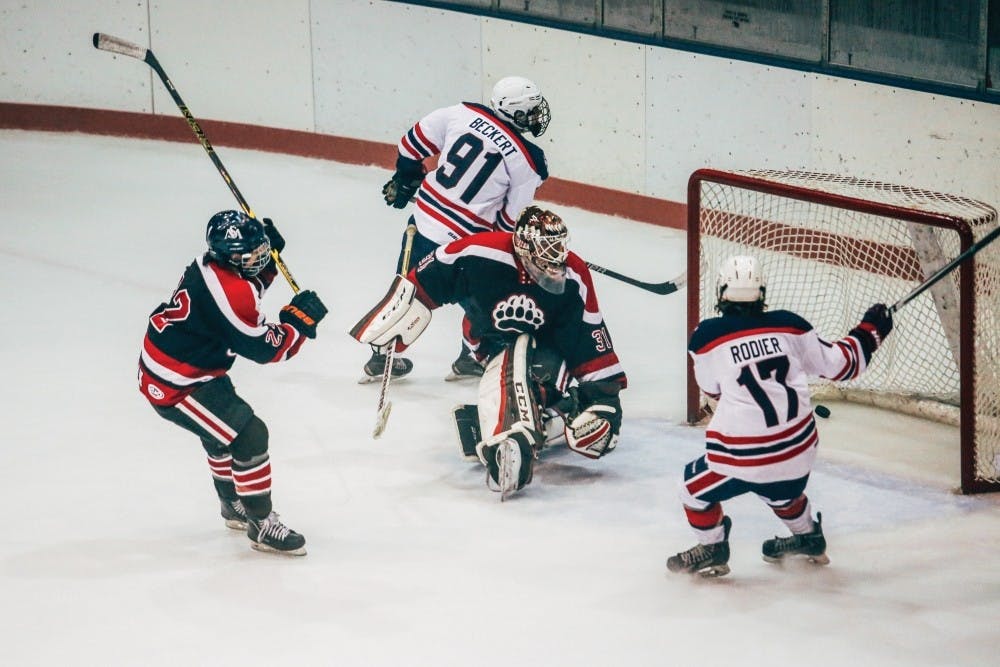On the easternmost edge of Penn’s campus is the Class of 1923 Arena. Inside the arena, above the ice rink and the seats, there’s a concrete walkway that rings around the building’s interior. Up there, there’s a little dugout with a table and internet access. That’s where Luke Mullan (C '19) sits when he commentates on the Penn Men’s Hockey club games.
Luke, a history major from Bethesda, Maryland, says that hockey is his fourth favorite sport. “After football, then soccer, then basketball,” he says unequivocally. He got started as the commentator for the men’s hockey his sophomore year. The captain of the team was in his fraternity, and Luke already had a radio show on WQHS, Penn’s student radio station. Luke says that growing up, he played every major sport except hockey. He would watch the Capitals when they were in the playoffs, but that was about it.
Luke says that extensive knowledge of hockey isn’t all that necessary for his job. “I’m never really saying anything too in–depth,” he says. “The only thing that’s pretty tough is getting the penalty calls down. But I know what offsides is, I know what icing is.”
Still, Luke says he makes mistakes all the time. He calls players by their wrong names and sometimes looks to the camera man (usually a player sidelined by injury who sits up by Luke) for help calling a play. It was especially hard when, at the beginning of the season, the chronically–underfunded team hadn’t updated their jerseys. Luke accidentally gave credit to players who had already graduated. Despite these mistakes, there is one comforting fact: “Not many people are watching, and that’s what I try to keep in mind,” he says.
There have been a few “debacles,” as Luke likes to call them. In this year’s Princeton game, the computer that streams the game started an automatic Windows update in the middle of the game. For people watching at home, that meant an hour of blank screen. But it was unavoidable. “I called the computer guys, and they were like, ‘Yeah man, you just gotta wait. Sorry about that,’” Luke says.
Another time, after the first period of last year’s game against Millersville, the zamboni malfunctioned while cleaning the ice—something about a burning tread on the wheel. The whole ordeal took about an hour. Luke tried to lighten the mood if anyone was still watching the online streaming. “Halfway through I just put on the headset and started commenting,” he says. “And there were like six dudes out there trying to get the zamboni to work. It was a big debacle.”
Each game, Luke gets a sheet with players’ basic information: name, number, height, weight, and stats. But beyond their performance on ice, Luke says he doesn’t know the players so well. Before and after games, Luke is in and out of the locker room, where the computer is kept. “I know four or five guys on the team,” Luke says. “I’ll meet dudes at a party or at rush or something, and they’re like, ‘Oh, you’re the commentator guy.’ And I’m like, ‘Oh, what number are you?’ And they’ll say their name, and I’ll be like, ‘Nice game against Millersville, but I don’t know anything about you.’”
When the team watches tape, they watch replays of Luke’s broadcasts. “I think some of the players don’t like me because I’m sometimes sort of critical,” Luke says. Luke’s also critical of professional sports announcers and sideline commentators. He doesn’t like clichés and empty questions. “If you ever watch Sunday night football, Chris Collins will say ‘dead to rights’ like five times a quarter,” he says. Luke thinks its a legal term. (Ed. note: he’s right.) But it’s those quirks, repeated game after game, that annoy Luke.
But does Luke have any idiosyncrasies in his own commentating style? “Oh, yeah, I’m sure,” he says. “I always say ‘full head of steam’ when somebody is charging up. When somebody takes it all the way across the blue line, I always say ‘take it over himself.’”
The hardest part of commentating, according to Luke, is probably not what you think. He says it’s easy to fill the time talking. “When there’s nothing happening, you can talk about the schedule, or what’s happening, what jerseys Penn is wearing, and where they’re going. So it’s pretty easy to fill that air,” Luke says.
The hard part is commentating the goals. In hockey, there might be 30 shots in a game. If only a tenth of those shots go in, as a commentator, you can’t get excited for every single one. Luke explains with an example. “Tucker with the wrist–shot and it’s in!” His voice rises with excitement as the imaginary shot turns into a success. Maybe hockey is just Luke’s fourth favorite sport, but he’s nonetheless animated, excited for that potential victory, narrating passionately from the sidelines.

